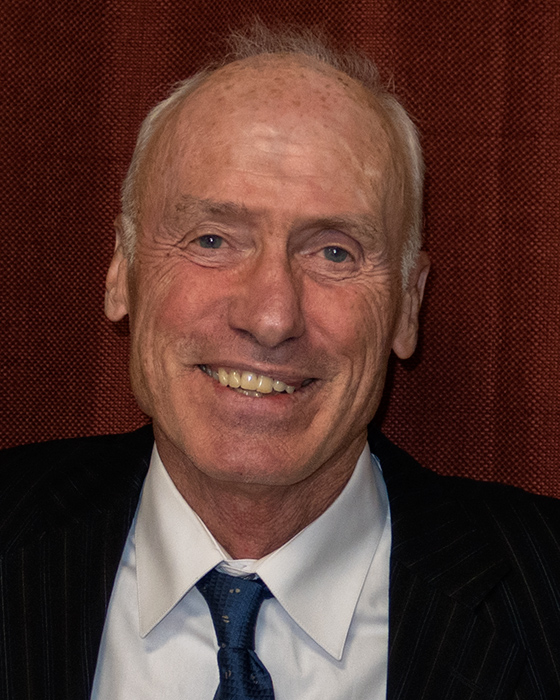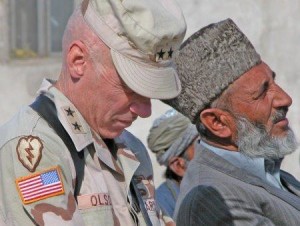Monday, May 9, 2016

Major General (Ret.) Eric Olson commanded the largest American ground force in Afghanistan, led one of the first battalions into Iraq in Desert Storm, served as Deputy Assistant Secretary of State for Iraqi Reconstruction, and wrote the after-action report on the Black Hawk Down operation in Mogadishu, Somalia. Gen. Olson traced the roots of conflict in the region and offered pungent remarks on America’s interventions there.
Olson said it is important to realize that “most of the Muslim world is not in conflict. We can’t paint one-fifth of the world’s population with the same color, and the same brush.” He cited stability in the world’s largest Muslim nation, Indonesia. India, a majority Hindu nation, has the second largest Muslim population and is also a stable democratic state. He indicated that there is a great deal of diversity in the Muslim world. In the United Arab Emirates (UAE), for example, approximately 85 percent of the residents are ex-pat immigrants.
Olson pointed out these major factors destabilizing portions of the Muslim world:
1) The legacy of colonialism in the Middle East has been disputed borders, ethnic and tribal rivalries, underdeveloped social, economic, and governmental institutions, and intra- and inter-state conflicts that have roiled the region since the departure of the European colonial powers.
2) The enduring pattern of non-democratic governance (including dictatorships, monarchies, and military governments) stifles opportunities and causes frustration. Where there is “no (sharing of) power, there is no hope.”
3) Oil: The competition for control of oil, and the use of resultant revenues results in conflict.
4) Radical Islam: There is no denying radical Islam has contributed to turmoil in a major way, but “there is nothing inherent in Islam” that provokes violence.
5) Foreign Intervention: The West and the former Soviet Union/Russia are not the only contributors to destabilization. There is also major intervention from within the region, from Iran and Israel in particular. He cited Iranian proxies such as Hezbollah participating in conflicts not only in Lebanon but also in Syria and Iraq. Iranian troops are also providing training, weapons, and logistical support to Shiite militias in Iraq and to the Houthis in Yemen that undermine existing government structures. Counter-terrorism operations in the region are also in the mix.
Olson said that, with the exception of Desert Storm, the American “military record generally has been a record of failure in the region,” suffering from overly ambitious goals. There has been a certain American hubris toward Mideast conflict, with some convinced that we know the right course of action. But we don’t understand the region, and “when we act as if we do,” even greater problems result. The conflicts are not primarily military; they are also economic, political, and religious, especially the Shi’a – Sunni split.
When asked whether Iraq was worse off for American intervention, he said it was: “There was no starvation before (the second Iraq war),” and the ongoing conflict has killed tens of thousands and created a refugee crisis. But Saddam Hussein was a terrible dictator who massacred his people, and “the Shi’a would say they are better off now.”
Discussing the rise of the ISIS, the Islamic State, Olson said that destabilization after the ouster of Saddam, coupled with Shi’a dominance and perceived persecution of Sunnis gave rise to Sunni rejectionists in Iraq. Their radicalization fueled the success of Al-Qaeda in Iraq, which latter morphed into ISIS.
When asked about the future of Iraq, Olson indicated that a Kurdish state “is just not politically viable. Turkey won’t allow it, and it would not receive international recognition. It is an unofficial state now,” and that will likely continue.
Olson said it was unlikely that U.S. forces would get involved in a “shooting war” in Syria with the Russian air force. He said the U.S. and Russia are coordinating closely “to prevent an accidental war.”
Olson currently resides in Abu Dhabi in the United Arab Emirates for the next six months, where he is helping to develop professional military career education programs, including the UAE’s equivalent of West Point. Olson is a former Commandant of the United States Military Academy at West Point, as well as a former assistant professor there.
